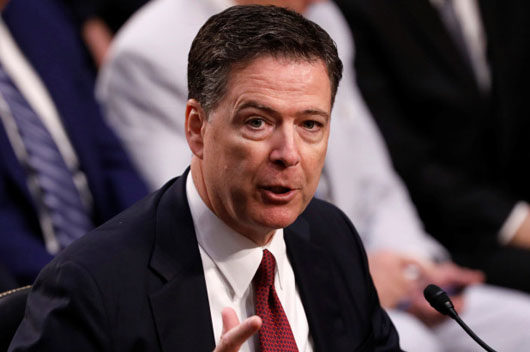by WorldTribune Staff, December 9, 2018
Former FBI Director James Comey seemed to suffer memory loss on several occasions during closed-door testimony before the House Judiciary Committee on Dec. 7 and at times struggled with simple questions on FBI procedure, according to a transcript from the meeting.
Under questioning by Republicans on the committee, Comey admitted the FBI used the infamous Christopher Steele dossier to obtain a FISA warrant on Trump campaign associate Carter Page even though he knew parts of it were unverified.

“Comey now has confirmed what Republican lawmakers like Rep. Devin Nunes, Sen. Charles Grassley, Rep. Mark Meadows and Rep. Jim Jordan have warned about for months – that the FBI used an unverified dossier, paid for by presidential candidate Hillary Clinton and the Democratic Party as political opposition research, to justify spying on the duly nominated GOP candidate for president just weeks before Election Day,” investigative reporter John Solomon wrote in a Dec. 8 op-ed for The Hill.
But the former FBI chief did stick to his tried and true talking points when he told lawmakers that the bureau’s investigation into Russian interference in the 2016 election did not begin with Steele’s dossier.
He indicated the probe started due to “the information we’d received about a conversation that a campaign foreign policy adviser (George Papadopoulos) had with an individual in London about stolen emails that the Russians had that would be harmful to Hillary Clinton.”
Comey is expected to appear before the House Judiciary Committee again on Dec. 17.
In the Dec. 7 closed-door session, Comey found himself under a direct line of questioning about Steele’s unverified dossier by Rep. John Ratcliffe, Texas Republican.
Ratcliffe: Okay. Well, do you recall that, on numerous occasions subsequent to October 21st of 2016, you, in your capacity as the FBI Director, referred to the Steele dossier as salacious and unverified?
Comey: Yes. I don’t know that I was referring to all of it. Maybe I was, but I had in mind some particular portions of it that were salacious and unverified.
Ratcliffe: But, again, your characterization of it was that it was unverified, even though you had verified it to the court?
Comey: Well, it was coming to us from a reliable source with a track record, and it’s an important thing when you’re seeking a PC warrant. But what I understand by verified is we then try to replicate the source information so that it becomes FBI investigation and our conclusions rather than a reliable source’s. That’s what I understand it, the difference to be. And that work wasn’t completed by the time I left in May of 2017, to my knowledge.
Comey also admitted to Ratcliffe that the dossier was not fully verified by the FBI before the bureau submitted it as evidence to the court and well after he signed off on the first FISA warrant on Page in October, 2016. He noted that the bureau was still in the process of trying to verify the dossier up until May 2017, when he was fired by President Donald Trump.
The Dec. 7 transcript also indicates Rep. Trey Gowdy, South Carolina Republican, had a difficult time getting straight answers from Comey.
Gowdy: When the Bureau uses sources or informants, are there agreements signed? Are there certain obligations on behalf of the source or the informant?
Comey: Yeah, I’m not expert enough to answer that. I’m sure that there are, but I don’t know the particulars.
Gowdy: Is it – would it be unusual for the FBI to tell a source or an informant, you can’t commit any other crimes while you’re working for the Bureau?
Comey: I believe that’s the case.
Gowdy: Would it be unusual for the bureau to tell a source or an informant, you can’t have media contact while you’re working for the bureau?
Comey: I don’t know whether that’s part of the standard warnings or directions to a source.
Gowdy: And you’re not familiar – Mr. Kelley. Excuse me. One second, please. Mr. Comey. Okay, thank you. I’m sorry. Go ahead. Mr. Gowdy. How did Chris Steele’s information reach the FBI?
Comey: I don’t know for sure. I have some recollection that he passed it to an agent that he knew and that that agent sent it on to headquarters. I think that’s the way in which it reached the Counterintelligence Division, but I don’t remember the specifics of that.
Gowdy: How did the Bureau investigate whatever information Steele provided?
Comey: I don’t know in particular. I know that the Counterintelligence Division was investigating various aspects of the reports he had supplied, and that investigation was ongoing when I was fired.
See the full 245-page transcript here
Check Out Geostrategy-Direct __________ Jump Start the U.S. Media
